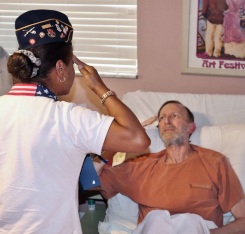Video: How Veterans’ Needs Are Changing Healthcare Today
November 7, 2022
MIAMI, FL — Each day, US veterans from the Greatest Generation, those who battled in WWII, become a smaller subset of the living veteran population. Service members who fought in the Korean War and Vietnam War are now the largest veteran group requiring care as they near the end of life—and their needs vary significantly from the generation before.
In a new video produced by VITAS Healthcare, veteran clinicians and healthcare professionals describe the changing needs and how care must adapt to meet these needs.
The Department of Veterans Affairs currently projects that there are 5.6 million Vietnam War veterans living today. Many of these veterans are nearing the end of life and with highly individualized needs.
The circumstances associated with this unique period of service have impacted the aging veteran population with health issues including toxic exposure (from burn pits and Agent Orange) and psychological trauma. Hospice care, provided by VITAS, takes measures to manage each of these complex health concerns and address the unique needs of Vietnam veterans.
"There's also moral injury,” notes Faith Protsman, MD, US Army veteran and VITAS regional medical director. “Most of our veterans grew up with values that are so different from what they had to do in the military. We see it at the end-of-life when their defenses are not as strong."
Moral injury often stems from factors such as unwanted service due to the draft, serving in an unfavorable war, and a lack of appreciation from their fellow countrymen when returning from their service to the nation.
Toxic exposure has been linked to leukemia, Hodgkin’s disease, non-Hodgkin's lymphoma, myeloma and many other cancers along with Parkinson’s, type II diabetes and other non-cancer related diseases.
With expertise in VA benefits and clinical teams focused on creating individualized care plans and interventions, VITAS hospice teams manage symptoms associated with their advanced diseases—which may or may not be a result of their service—while helping veterans receive the benefits to which they are entitled.
VITAS holds pinning ceremonies, gives veterans certificates of recognition and provides bedside salutes to give those who are facing moral injury much-needed solace, acknowledging all that they have sacrificed to preserve the freedoms that Americans hold so dear. It is often these gestures that help Vietnam veterans obtain the closure needed to pass on more peacefully.
The age range for Vietnam War veterans is 62 to 104 years old, making them currently the most prevalent veteran demographic nearing the end of life. As the population shifts, hospice care providers must do all they can to meet the needs of Baby Boomer veterans.
As the nation’s leading provider of end-of-life care, VITAS is committed to serving those who have served our country when they need it most. Learn more at VITAS.com/veterans.
